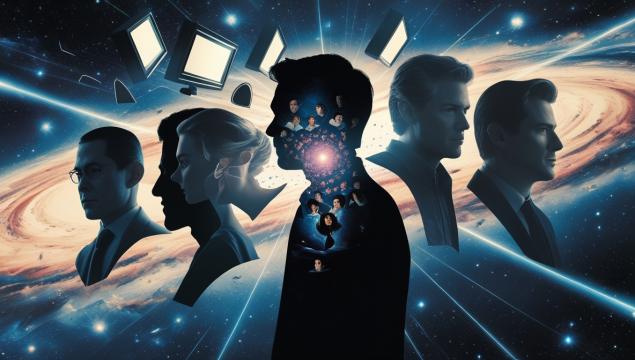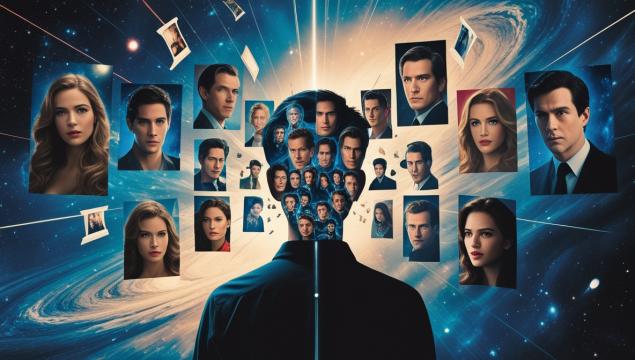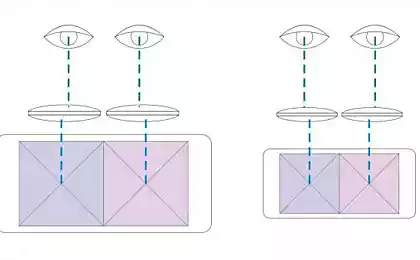164
The mirror of the soul: how the heroes of the screen reveal our true desires

Alexey Arestovich’s method for deep self-knowledge through the analysis of idols
We all have a collection of heroes in us. They populate our imaginations, shape our dreams, and quietly influence life choices. Ukrainian political analyst and psychologist Alexey Arestovich proposed a revolutionary approach to working with idols – a method that turns simple admiration into a powerful tool for self-discovery and personal growth.
Our heroes are not random choices. It is a map of our hidden needs, unfulfilled talents, and deep aspirations.
Psychology of attraction to heroes
The phenomenon of identification with fictional characters has been studied by psychologists for more than a century. Carl Jung, in his theory of archetypes, explained that certain images resonate with our collective unconscious. Modern research confirms that the choice of idols is directly related to our personal characteristics, current life tasks and internal conflicts.
Projection mechanism in operation
When we admire Sherlock Holmes, we project on him our need for logic and order. Falling in love with James Bond makes up for the lack of adventure in our lives. Arestovich suggests using this psychological mechanism consciously as a tool for understanding oneself and planning development.

Three key questions Arestovich
Arestovich’s method is based on three fundamental questions to ask yourself when analyzing any attractive image. These questions act as psychological x-rays, highlighting the ulterior motives of our admiration.
Question one: What's your personal response?
This question is aimed at identifying emotional resonance. It is important to determine not the superficial characteristics (beauty, success, popularity), but the underlying qualities that cause an internal response. Perhaps it is not the hero’s courage that attracts you, but his ability to act in spite of fear. Or not his wealth, but the freedom of choice he gives.
Question two: What is missing from this hero?
It is important to be extremely honest here. This question helps to identify areas for development and hidden complexes. If you admire the character’s confidence, you may feel a lack of self-esteem. If his ability to lead attracts him, it is worth thinking about developing managerial skills.
Question three: Who am I without this image and what would a hero do in my situation?
The most difficult and important question. He requires the separation of his own personality from the projected image and at the same time suggests using the hero as a mental adviser. This allows you to integrate the best qualities of an idol into your own life without losing authenticity.
Practical application of the method
Case study: Manager Anna, 28, discovered that her idol is Hermione Granger from Harry Potter. Applying the Arestovich method, she realized that she was attracted not so much by the erudition of the character as by her willingness to stand up for justice, even if it is unpopular. Anna realized that in her own life she avoided conflicts for fear of rejection. Asking, “What would Hermione do?” she began to express her opinion more actively in working meetings, which eventually led to career growth.

Scientific justification of the method
The Arestovich method is based on several psychological concepts. Albert Bandura’s theory of social learning shows that we learn by observing the behavior of others. Hazel Marcus explains how images of a desired future motivate us to change. Research by neuropsychologists confirms that when observing the actions of others, the same areas of the brain are activated as when you yourself act - the phenomenon of mirror neurons.
Algorithm of working with the image of the hero
Step 1: Choose a character that evokes a strong emotional response.
Step 2: Write down the first associations and emotions it evokes.
Step 3: Analyze each characteristic through the prism of Arestovich's three questions.
Step 4: Identify specific areas for development.
Step 5: Create an action plan using the hero as a mental mentor.
Misinterpretation of heroes
One of the main pitfalls is superficial identification with the external attributes of the hero’s success, ignoring his inner qualities and path of development. Another common mistake is trying to completely copy the behavior of the character, without considering the context of his own life and personal characteristics.
Remember: the goal is not to become a copy of the hero, but to develop the qualities that he embodies.
Long-term effects of the method
Regular use of the Arestovich method leads to an increase in self-awareness, a more conscious choice of goals and strategies for achieving them. People who practice this approach report improved self-motivation and a clearer understanding of their own values and priorities.
Conclusion
Alexey Arestovich’s method turns passive consumption of media content into an active process of self-knowledge and development. Every film, book, or TV series is an opportunity to better understand yourself and identify growth directions. In a world where we are constantly surrounded by images and stories, this approach gives us a tool to consciously use their influence on our lives.
Glossary
Identification The psychological process of identifying with another person or character, the adoption of his qualities and characteristics.
projection The defense mechanism of the psyche, in which a person attributes to others his own unconscious feelings, thoughts or motives.
Archetypes Universal images and behavior patterns embedded in the collective unconscious of all mankind (according to K. G. Jung).
Mirror neurons Brain cells that are activated both when performing an action and when watching someone else perform the action.
Social learning Learning by observing and imitating the behavior of others.
Self-actualization - the desire of a person to the most complete identification and development of his personal capabilities.
Authenticity Correspondence of the external manifestations of man to his inner essence, sincerity in relation to himself.
Mental mentor. An imaginary adviser based on the image of a real person or character who is approached for mental advice.
What's your attitude to life? Victim, Child, Wrestler, Player or Author?
How to develop a positive self-image to succeed at work and in relationships























